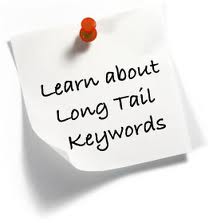In the process of Search Engine Optimization (SEO), keywords are the foundation you will build upon. If your foundation is messed up, your SEO strategy will come crashing down quickly. Here are some tips as to why you should target long tail keywords.
There are many schools of thought when it comes to selecting keywords to target but there is one important reality to keep in mind…
More than 80% of all traffic for all websites comes from long-tail keywords. Just ask any website owner and they will tell you it’s true. A long tail keyword is typically considered to be a specific keyword with 3 or more words. The opposite would be a head term that is usually 1 or 2 words and very broad and typically very competitive.
Fishing With a Large Net
For example, “affordable website” would be considered a head term while “what are affordable website options” would be considered a long tail keyword.
The question for many internet marketers and new website owners is – which keyword do I target? The head term or the long tail term? With 80% of traffic coming from long tail keywords, many people think that they should focus on them. But I would say the focus should be on both head keywords and long tail keywords starting first with head keywords.
Focusing on the long-tail keywords first would be like fishing with a very small net to catch only certain fish. Using a big net will allow you to catch many fish, including the specific type you want.
So my first step would be to use the large net and focus on the head keyword, “affordable website”, in this case. I would create my page to be optimized for that keyword using page using titles, descriptions, image tags, and appropriate content. If you don’t know how to do this, you should read more about on page SEO.
Long tail keywords, by their very nature, are usually unknown. You usually don’t realize they exist until you view your website statistics and see that visitors to your website entered these search keywords to find your website. So it’s difficult to optimize your site for them. Most often, when creating a page that is optimized for “affordable website”, you will naturally rank well for many long tail keywords having to do with “affordable website”. If I do know of specific long tail keywords that I want to target, I may include them as a heading or make sure they are within the text content a few times on the page.
After creating the page optimized for “affordable website”, I typically would view the traffic statistics for the page after a few months and see what long tail keywords are generating traffic to the page. There may be some high potential long tail keywords that should be optimized more on your page or if there is a significant amount of traffic, it may be smart to create a brand new page optimized for that keyword.
So the process is this:
- Create a page for a head term
- Analyze the traffic statistics for long tail keyword opportunities
- Optimize the page further for long tail keywords or create new pages or blog posts optimized for specific long tail keywords
Go Beyond The Keywords
Some competitive keyword terms like “affordable website” are pretty obvious but many are not so obvious. There are some great tools to do keyword research and I talk about them and a bunch of other great tools and methods for Search Engine Optimization in my free Search Engine Marketing Guide for Small Businesses. This guide will help you go beyond just keywords and start promoting your site to increase it’s popularity in the search engines and ultimately increase the traffic coming to your site.






